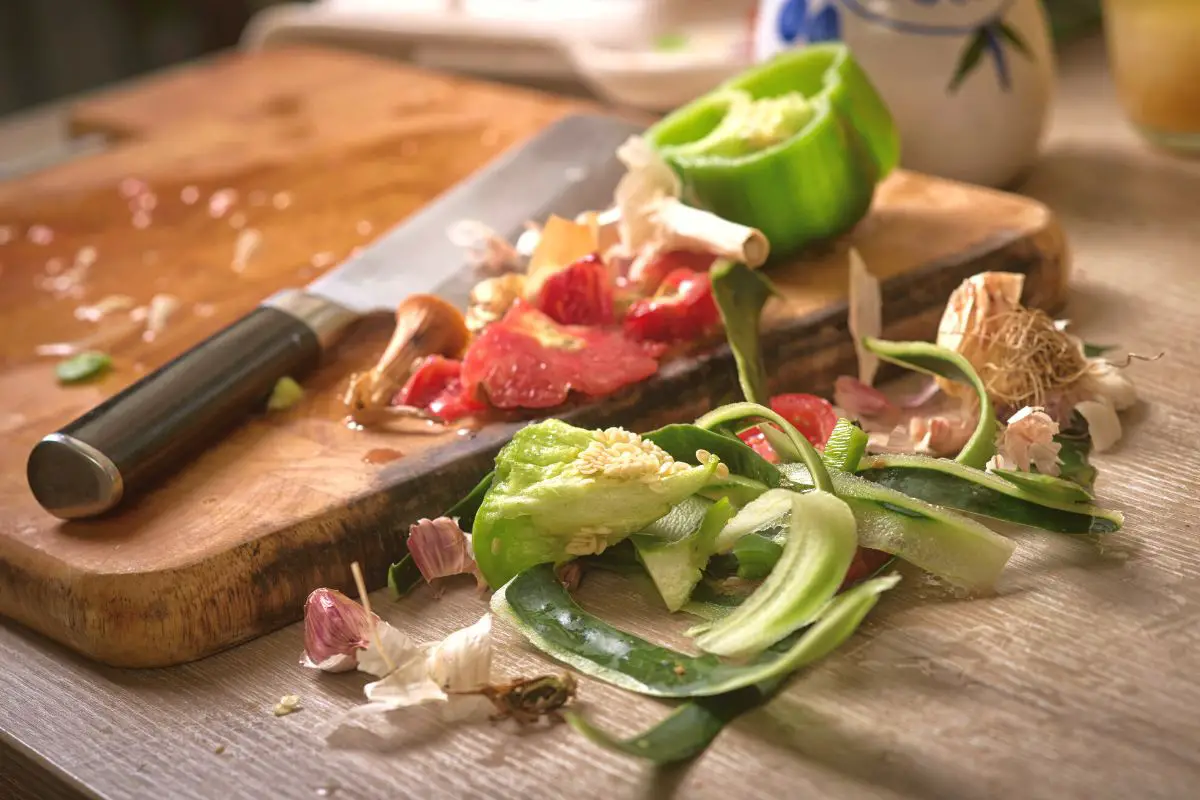Wondering How to Go About Composting in an Apartment?
Composting is one of the best solutions to our global food wastage problem. If you want to reduce the amount of food waste that goes to the landfill, you can do your own composting at home. Fortunately, this is still very possible in an apartment! The type of composting you choose will depend on your situation.
Related Articles: Bokashi vs Composting and Best Bokashi Bucket
Various Ways to Compost in an Apartment
Whether you have a large or fairly small space, you are not doomed to throw your food waste away! Composting is the best way to eliminate organics, such as kitchen scraps and extra food while making food for your house plants. At least someone likes it!
While you cannot build a giant, open bin for composting in your apartment, there are many other options suited to composting in an apartment. With technological advancements, you will see that composting becomes easy and even cool!
Here are the various ways you can compost in your apartment.
Worm Composter Bin
This is one of the most common types of indoor composting. When doing indoor composting, it is important to have a good combination of nitrogen and carbon. Carbon can be paper, dry leaves, cardboard, or shredded paper.
Nitrogen is your food scraps. So, keeping your compost about 50% food scraps and 50% other items is best. Then get your vermicomposting worms, such as red wrigglers! You can keep your worm composter bin outside, but they actually prefer room temperature, which makes them perfect for an apartment that doesn’t have a balcony.
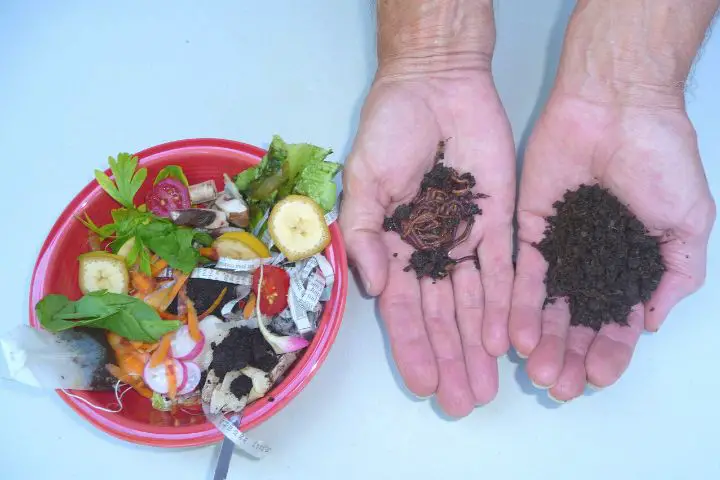
Vermicomposting can be done all year too!
This method is best if you don’t mind handling worms. The composting process is amazing to observe, as they eat through your scraps and create castings (basically poop). This is the best food for your plants! You don’t have to turn over the compost, as your worms do it for you!
Bokashi Indoor Composting
This is an intriguing composting method and is super easy to do. The Bokashi composting system does not actually compost your food but infuses the waste with microbes that break food waste down. You just add your compost, including dairy and meat, then add the bokashi bran, and you’re done!
You should have your compost in 4 weeks. You don’t have to keep a balance of carbon and nitrogen, and only food scraps can be added to the activator mix. Beware, though; bokashi composting bins can smell slightly acidic!
Electric Compost Bin
If you want an indoor-composting system that is fast, easy and has no smell, then an electric compost bin is the way to go. It is the size of a small appliance and can be placed on your kitchen countertop. Put in your food scraps, turn on the nifty thing, and let it work to turn your scraps into valuable soil that you can add to your indoor plants.
Some electric compost bins can do this process in just 4 hours!
An electric compost bin is the best option if you live in a small apartment. Other indoor composting methods need a bit of space, which you may not have to spare. The electric compost bin is the size of a food processor, so that it will fit perfectly in a kitchen.
Farmers’ Market

Most farmers at the market will have large compost piles, which they use for their plants. They usually take food scraps and the occasional ends of vegetables that people throw out. You can ask one of the farmers if you can add your scraps to their pile.
Apart from the farmers, you can ask just about anyone. People who are avid gardeners would love to take your food scraps for their compost pile. You can ask around!
Community Garden
Usually, a community garden will have compost piles/plots. If your apartment block has them, then you’re in luck! You might make some new friends, correctly get rid of your food scraps and get some fresh veggies!
What Can be Composted?
Knowing what can and cannot be composted is important, as composting inorganic items can attract pests, cause a foul odor and harm the other ingredients in the compost.
Here’s an easy list of things you can and cannot compost.
Compostable items
- Nutshells can be broken into smaller pieces to help the decomposition process happen faster.
- Eggshells, which add calcium to your compost.
- Vegetable scraps, such as whole veggies and skins.
- Food paper goods, such as paper towels, napkins, and greasy food boxes.
- Newsprint paper, as this is free from colored paper toxins.
- Dead leaves, which add lots of carbon to your compost.
- Any type of cardboard, as long as it is shredded into small pieces.
- Wood shavings and sawdust from real, untreated wood.
- Branches, twigs, hay, pine cones, and straw add some life to your compost too!
- Old, dying flowers. Don’t add flowers that have died from plant disease.
- Loose tea bags, leaf tea, coffee grounds, and coffee filters are great for your compost bin, as they add nitrogen.
- Grass clippings, which have lots of nitrogen.
- Spoiled veggies (don’t forget to cut them into smaller pieces!).
- Unused fruits; however, avoid adding peels.
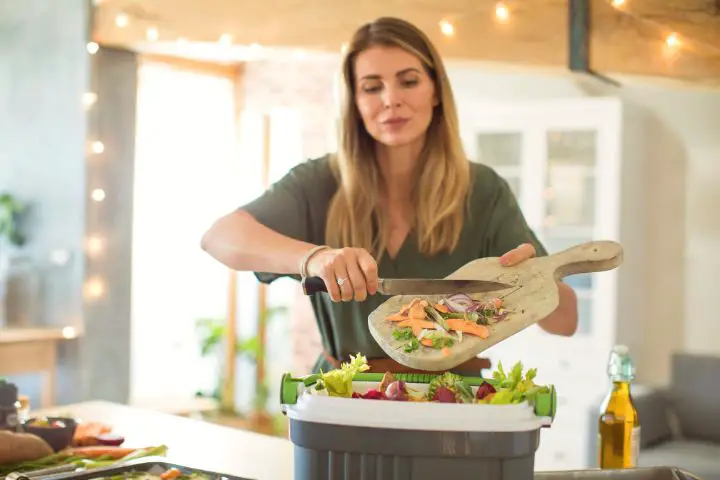
Non-Compostable Items
- Rotting/diseased plants- You should not add any plants that may have died from diseases, as they will spread in your compost soil.
- Pet droppings- Pet waste has unhealthy bacteria and parasites, which can affect your compost bin, yourself, and other animals.
- Coal ash- This contains harmful metals and chemicals that can taint your compost and damage your plants.
- Cooking oil/fat- You can compost small amounts of cooking oil, such as corn oil, sunflower oil, olive oil, or rapeseed oil. However, you should not add too many fats, as it slows down the composting process.
- Citrus skins- You should avoid adding orange, lemon, or banana peels if you have a vermicomposting bin. Things such as citrus pulp and other acidic fruit in high numbers can kill your worms.
If you have a worm composting bin, you should not add meat and dairy products, as they can harm your worms and create an unpleasant smell. You can meat and dairy if you have a compost bin without worms, preferably kept outside in the balcony. If you don’t want to do this, you can also save your scraps in the freezer for donations.
Tips to Remember When Composting in an Apartment
Keep these pointers in mind when you’re embarking on your composting mission:
- Turn the contents of the compost bin often. This creates warmth in the bin, which increases the number of microbes. Turning it over can also reduce dry pockets and keep the bin dry. You can move the contents around with a shovel or a hand towel. If you have your stuff in a bucket, then shake it a couple of times to mix it.
- Always have a little stash of dry leaves, shredded paper, or coffee grounds. You can add these to your bin when you put in your food scraps. This ensures that the bin does not get too soggy, as well as provides carbon to the bin.
- Chop your food scraps smaller for quicker composting. Small items break down quicker than large ones. Shred your paper into thin strips as well.
Frequently Asked Questions
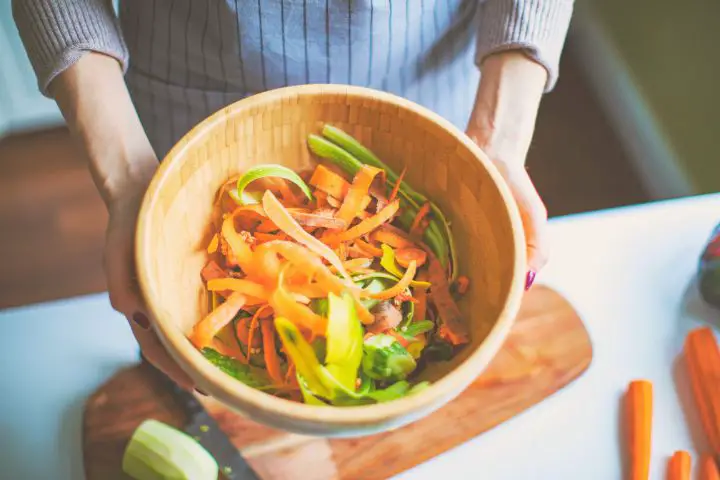
What should I do if I see maggots in my compost?
If you see maggots, don’t stress! I understand that seeing maggots wiggling in your compost bin that be terrifying, but it doesn’t mean that it’s the end of your composting. Maggots help to break down the scraps in the compost, which allows it to mature faster.
However, if the creepiness is a bit too much (understandable), you can add more shredded paper, grass, or cardboard to the bin. This will keep your compost bin dry, which keeps the maggots away. You can also add a lid (if you’re using a bucket) so flies can’t get in. Bury the food scraps deep in the bin.
What can I use mature compost for?
You can use your compost for the following things:
- As mulch- Apply a layer of compost on the exposed soil to keep weeds away, and help your plants retain moisture.
- Compost tea- Steeping your compost in water overnight creates compost tea, which has a concentrated amount of nutrients. This can be sprayed on your plants.
- Freshen the soil in your indoor plants- Adding compost to your potted plants can increase growth, especially when transferring to a bigger pot. Mix compost with soil for the best effects.
You can also donate your compost to a local farmer, school or anyone who is interested.
Will the compost bins make my apartment smell?
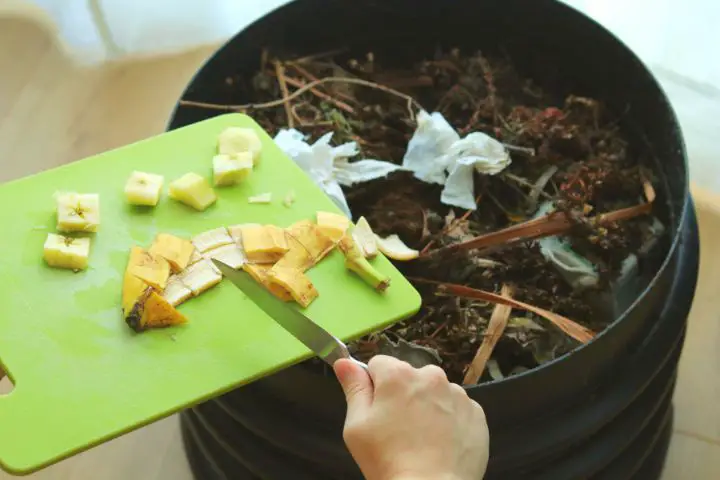
A properly balanced compost bin will not create any foul smells. However, if you use too many items that produce nitrogen, you don’t turn it over regularly, and it creates too much moisture, then you are at risk of a smelly compost bin. So, remember to have a good balance of carbon and nitrogen!
Where can I store my compost?
You can store your compost bins in a closet, next to the trash and recycling cans, or below the kitchen sink. This will keep the compost out of your way and safe from extreme temperatures.

